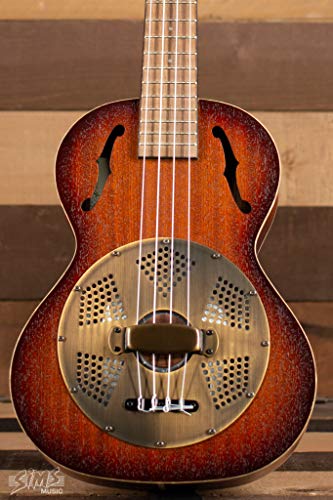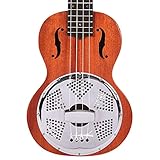The ukulele resonator, also known as the “uke,” is a small guitar-like instrument originating from Hawaii. It gained popularity in the early 20th century and is commonly associated with Hawaiian music and culture. The resonator ukulele, on the other hand, is a variation of the traditional uke that features a resonator cone to produce a louder and more distinct sound. The use of resonator ukuleles has grown in recent years, particularly in the bluegrass and folk music genres, where its unique tone and projection have found a niche among musicians and enthusiasts.
The steel body resonator, also known as the dobro, is a type of resonator guitar that was developed in the United States in the 1920s. Its distinctive sound comes from the use of metal cones and a metal body, which amplifies the vibrations of the strings. With its roots in blues, bluegrass, and country music, the steel body resonator has had a significant impact on American music and continues to be favored by musicians looking to add a rich, full-bodied sound to their repertoire.
The main difference between the two instruments lies in their construction and the type of resonator used. The ukulele resonator utilizes a smaller, single cone resonator, which provides a bright and punchy tone that is well-suited for traditional Hawaiian music as well as modern folk and bluegrass. In contrast, the steel body resonator features a larger, tricone or single cone design that produces a louder, more powerful sound with a distinctive metallic twang, making it a popular choice for slide and blues guitar players.
Both the ukulele resonator and the steel body resonator have their own unique appeal and are beloved by musicians for their ability to cut through a mix and add character to a wide range of musical styles. Whether you’re drawn to the sweet, jangly sound of the ukulele resonator or the bold, twangy tones of the steel body resonator, there’s no denying the lasting impact these instruments have had on the world of music. Whichever you choose, the resonator’s distinctive sound is sure to make a statement in any musical setting.
What are the differences between Ukulele Resonator Ukulele and Steel Body Resonator?
When it comes to resonator ukuleles, there are two main types to consider: traditional ukulele resonator and steel body resonator. Both options offer unique characteristics and benefits that are worth exploring. In the following article, we will delve into the differences between these two types of resonator ukuleles, and explore the various features and advantages of each, to help you make an informed decision when choosing the right resonator ukulele for your needs.
Ukulele Resonator Ukulele Vs. Steel Body Resonator
When it comes to choosing a resonator ukulele, there are two main options to consider: the traditional wood body resonator ukulele and the steel body resonator ukulele. Each type of resonator ukulele has its own unique characteristics and sound, making it important to understand the differences between the two.
Wood Body Resonator Ukulele
The wood body resonator ukulele is the more traditional of the two options. It typically features a wooden body with a metal resonator cone and biscuit bridge. This type of resonator ukulele produces a warm, rich, and mellow tone that is well-suited for a wide range of musical styles, including blues, folk, and Americana. The wooden body also adds to the overall aesthetic appeal of the instrument, making it a popular choice among ukulele enthusiasts.
- Warm, rich, and mellow tone
- Suitable for blues, folk, and Americana
- Aesthetic appeal
Steel Body Resonator Ukulele
On the other hand, the steel body resonator ukulele features a metal body, typically made from steel or brass. This type of resonator ukulele tends to produce a brighter and louder sound, with greater emphasis on volume and projection. The steel body resonator ukulele is often favored by musicians who play in louder or more amplified settings, such as bluegrass or country bands, due to its ability to cut through the mix and be heard clearly.
- Brighter and louder sound
- Greater volume and projection
- Suitable for louder or amplified settings
Ultimately, the choice between a wood body resonator ukulele and a steel body resonator ukulele comes down to personal preference and the specific musical context in which the instrument will be used. Both types of resonator ukulele have their own distinct qualities and can add a unique flavor to your music.
Statistic
According to industry data, the global ukulele market is expected to reach a value of $105.2 million by 2026, with continued growth driven by rising interest in music and increasing accessibility of musical instruments.
What is the difference between a ukulele resonator and a steel body resonator?
A ukulele resonator features a cone or biscuit resonator, which produces a unique, bright, and loud sound. On the other hand, a steel body resonator utilizes a metal body to amplify the sound, resulting in a more metallic and twangy tone.
Which type of resonator ukulele is better for beginners?
For beginners, a ukulele resonator might be a better option as it produces a more traditional ukulele sound. However, some beginners may prefer the unique tone of a steel body resonator. It ultimately comes down to personal preference.
Are resonator ukuleles louder than traditional ukuleles?
Yes, resonator ukuleles are generally louder than traditional ukuleles due to the resonator cone or metal body that amplifies the sound.
Can I play different music genres on a resonator ukulele?
Yes, a resonator ukulele is versatile and can be used to play various music genres such as blues, jazz, country, and traditional Hawaiian music.
Do resonator ukuleles require a different playing technique?
While some players may adjust their technique slightly to accommodate the unique tonal characteristics, resonator ukuleles can generally be played using the same techniques as traditional ukuleles.
Can I use a pick with a resonator ukulele?
Yes, you can use a pick with a resonator ukulele to achieve a different tone or to play more dynamically. However, many players prefer fingerpicking to retain the instrument’s traditional sound.
Do resonator ukuleles require special care or maintenance?
Resonator ukuleles require regular maintenance and care to ensure optimal performance. This includes keeping the instrument clean, adjusting the cone or biscuit if necessary, and maintaining proper humidity levels.
Are resonator ukuleles more expensive than traditional ukuleles?
Resonator ukuleles are often priced higher than traditional ukuleles due to the additional components and construction involved in creating the resonator sound. However, prices can vary depending on the brand and quality of the instrument.
Can I use a resonator ukulele for performances or recording?
Yes, resonator ukuleles are suitable for performances and recording, especially if you’re looking for a unique and impactful sound. Many professional musicians use resonator ukuleles in their performances and recordings.
Which type of resonator ukulele is best for achieving a specific tone?
If you’re looking for a bright and loud sound, a ukulele resonator with a cone or biscuit resonator is the best choice. If you prefer a more metallic and twangy tone, a steel body resonator would be more suitable for your needs.
Conclusion
In conclusion, both the ukulele resonator and steel body resonator offer unique benefits and qualities that cater to different preferences and playing styles. The traditional ukulele resonator provides a warm, mellow tone and a lightweight, portable design, making it ideal for traditional Hawaiian music and casual playing. On the other hand, the steel body resonator produces a louder, brighter sound with enhanced sustain, making it suitable for genres like blues, jazz, and folk music. Its metal construction also provides a unique aesthetic and durability, perfect for live performances and recording sessions.
Ultimately, the choice between a ukulele resonator and steel body resonator depends on the player’s musical preferences, intended use, and budget. Both instruments offer their own distinctive characteristics, and it’s important for players to consider these factors when making a decision. Whether it’s the classic, mellow sound of the ukulele resonator or the bold, resonant tones of the steel body resonator, both instruments have their own place in the world of music, and each can bring a unique and enjoyable playing experience to musicians and audiences alike.







